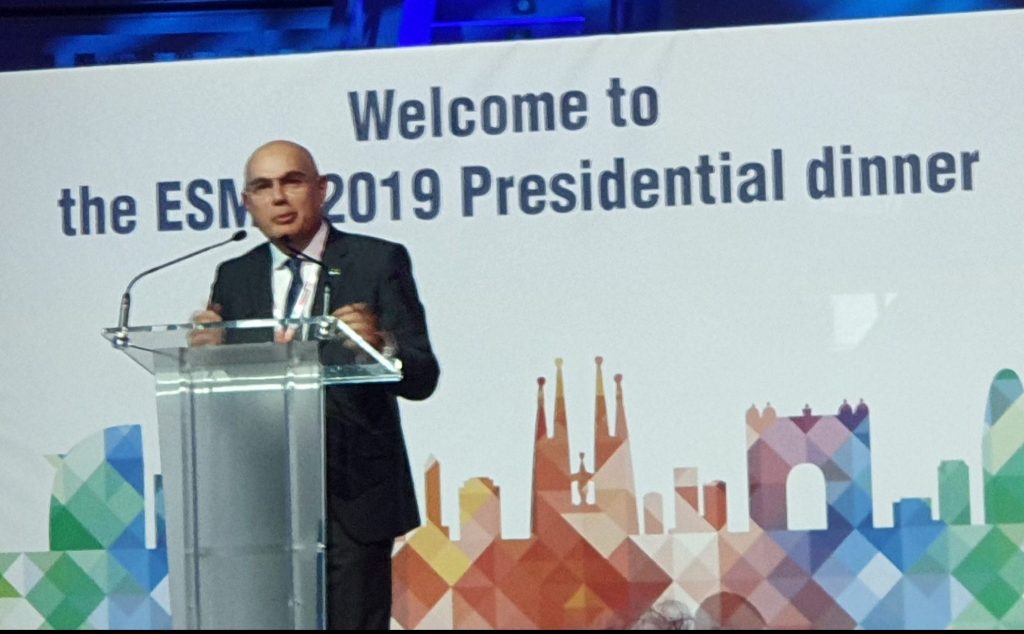Results from FIGHT-202, a phase 2 study of pemigatinib as a second-line treatment for patients with advanced/metastatic or surgically unresectable CCA, were presented by Prof. Antoine Hollebecque (Gustave Roussy Cancer Center, France). Eligible patients had locally advanced or metastatic CCA despite at least 1 line of prior therapy and had their FGF/FGFR status centrally confirmed. Adequate renal function was required.
A total of 1,206 patients were screened to find 127 with FGFR2 alterations; 107 patients with FGFR2 fusions/rearrangements (cohort A), 20 patients with other FGF/FGFR genetic alterations (cohort B). An additional 18 patients were enrolled with no FGF/FGFR alterations (cohort C). Among the 107 patients in cohort A, there were 92 fusions and 15 rearrangements discovered. A total of 56 unique fusion partners were identified, the most common of which was BICC1, which occurred in 29%. Median age of the entire 146 patients enrolled was 59 years, but those in cohort A tended to be younger, said Prof. Hollebecque, with 77% being younger than 65 years, compared with 50% in cohort B and 39% in cohort C. Some 58% of patients were women (61% in cohort A), and 61% were enrolled in North America, 24% in Western Europe, and 15% in the rest of the world.
Patients in the 3 cohorts were treated with oral pemigatinib (13.5 mg) using a 2 weeks on/1 week off schedule. The study was not designed to make statistical comparisons between the 3 cohorts. The primary endpoint was the confirmed ORR in cohort A by independent central review.
Results demonstrated an objective response rate (ORR) in cohort A of 35.5% and the median duration of response was 7.5 months. In contrast, there were no responses observed in cohort B or C. The higher ORR translated into a longer median progression-free survival (PFS) in cohort A. Median PFS was 6.9 months in cohort A compared with 2.1 months in cohort B and 1.7 months in cohort C.
Overall survival (OS) data were not yet mature at the time of data cut-off (March 22, 2019), but with a median follow-up of 15.4 months and a median duration of treatment of 7.2 months, the median OS was 21.1 months in cohort A, whereas median OS was only 6.7 months in cohort B after a median follow-up of 19.9 months, and only 4.0 months in cohort C after a median follow-up of 24.2 months.
In cohort A, the 35.5% ORR consisted of 3 (2.8%) complete responses, 35 (32.7%) partial responses, and 50 (46.7%) patients with stable disease, for a disease control rate of 82%. The ORR was consistent across subgroups, including when stratified by the number of prior lines of therapy and by FGFR2 rearrangement partner.
Adverse events (AEs) were manageable and consistent with the mechanism of action of pemigatinib. The most common AE was hyperphosphatemia, which occurred in 60% of patients but no grade ≥3 cases were encountered.
Based on the results of FIGHT-202, a phase 3 study evaluating first line pemigatinib compared with standard chemotherapy (gemcitabine plus cisplatin) in patients with CCA and FGFR2 fusions/rearrangements is ongoing.
- Vogel A et al. ESMO Congress 2019. Abstract LBA40.
Posted on
Previous Article
« IDH1+ cholangiocarcinoma: phase 3 results show improved PFS Next Article
Prostate cancer: spare radiotherapy after surgery »
« IDH1+ cholangiocarcinoma: phase 3 results show improved PFS Next Article
Prostate cancer: spare radiotherapy after surgery »
Table of Contents: ESMO 2019
Featured articles
Interview with ESMO President Prof. Josep Tabernero
Breast Cancer
Triple negative breast cancer gets positive news: KEYNOTE-522 interim results
CDK4/6 inhibitors change landscape of breast cancer treatment: 2 studies
Veliparib-chemo combo prolongs survival without disease progression in some advanced breast cancer patients
Lung Cancer
Improved response rates without survival benefit with pembrolizumab in pretreated mesothelioma
Frontline ipilimumab/nivolumab improves OS in advanced NCLSC
First-line osimertinib significantly lengthens OS in NSCLC
Liquid biopsy to decide the best treatment for NSCLC
Melanoma
Long-term data from CheckMate 067
Adjuvant nivolumab provides benefit
Nivolumab+ipilimumab superior to monotherapy for melanoma brain metastases
GI Cancers
Preoperative chemotherapy for colon cancer
Nivolumab improves OS in advanced oesophageal cancer
Liquid biopsy identifies relapse in patients with colorectal cancer after surgery
In hepatocellular carcinoma, CheckMate 459 misses OS endpoint, but some interesting trends emerge
Heavily pre-treated GIST: ripretinib improves PFS
FGFR2+ cholangiocarcinoma: pemigatinib active as second-line treatment
IDH1+ cholangiocarcinoma: phase 3 results show improved PFS
Advanced colorectal cancer and BRAF mutations: triplet combination improves survival
Genitourinary Cancers
25% reduction in the risk of death in patients with nmCRPC treated with apalutamide
Enfortumab vedotin and pembrolizumab in advanced bladder cancer: initial results
PARP inhibition in selected patients slows progression on advanced prostate cancer
PFS extension with immunotherapy + chemotherapy in urothelial cancer
Third-line in mCRPC: CARD trial
Prostate cancer: spare radiotherapy after surgery
Novel mode of action for kidney cancer treatment
Gynaecological Cancers
Ovarian cancer patients benefit from combined maintenance therapy
Combination of PARP inhibition plus chemotherapy in ovarian cancer
PFS benefit with niraparib as first-line maintenance in ovarian cancer
CNS Tumours
Ceritinib in ALK+ NSCLC brain metastases
Solid Tumours/Pan-Tumour Data
Mixed data: AMG 510 in tumours with KRASG12C
DNA profiling of carcinoma of unknown primary should inform treatment
Larotrectinib: safe and effective in TRK fusion-positive tumours
Related Articles
November 26, 2019
Frontline ipilimumab/nivolumab improves OS in advanced NCLSC

November 26, 2019
Interview with ESMO President Prof. Josep Tabernero
November 26, 2019
Nivolumab improves OS in advanced oesophageal cancer
© 2024 Medicom Medical Publishers. All rights reserved. Terms and Conditions | Privacy Policy

